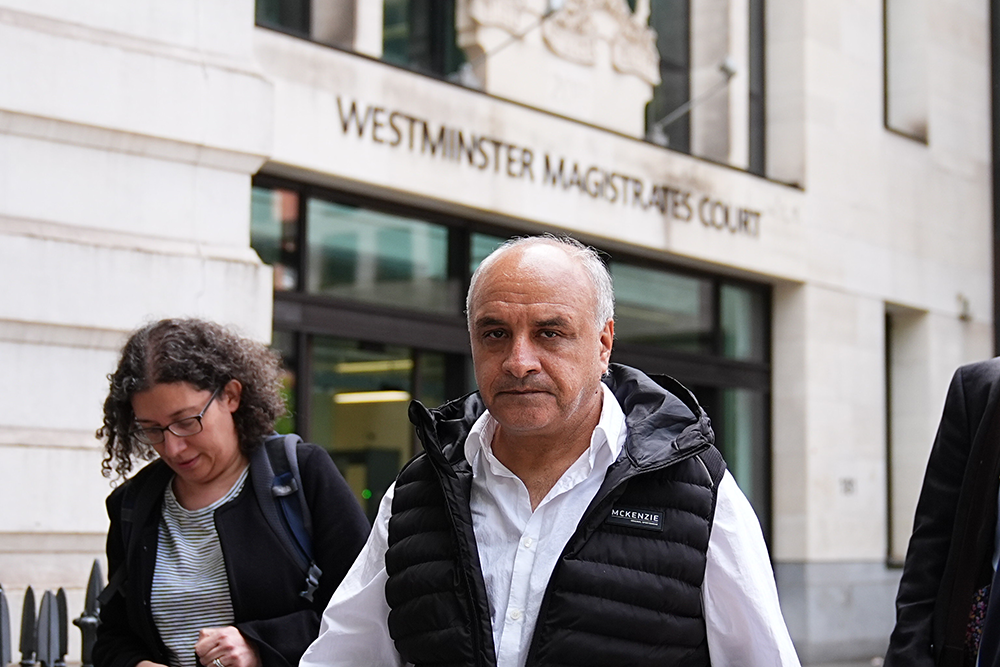The conviction of Hamit Coskun of a public order offence for burning a Quran has today been overturned by Southwark Crown Court. It’s a vital victory for free speech in the UK, as well as for Mr Coskun, and the National Secular Society and the Free Speech Union, which defended him.
It’s a mark of the embattled state of free expression in Britain that it ever came to this point
In February, Hamit Coskun had gone to the Turkish Consulate in Knightsbridge with a copy of the Quran and burnt it, while shouting, ‘Islam is religion of terrorism’. A Muslim man, Moussa Kadri, then emerged from a nearby building and remonstrated with him, before leaving, returning with a knife, and attacking Coskun with it. Outrageously, the fact he was attacked was itself taken as evidence that Coskun’s behaviour was disorderly. District Judge John McGarva said Coskun had ‘deep-seated hatred of Islam and its followers’. Coskun was originally found guilty of a ‘religiously aggravated public order offence’ for burning the Quran and fined £240 with a statutory surcharge of £96.
‘Had the verdict been allowed to stand it would have sent a message to religious fundamentalists up and down the country that all they need to do to enforce their blasphemy codes is to violently attack the blasphemer, thereby making him or her guilty of having caused public disorder’, said FSU director Toby Young. ‘Instead, the Crown Court has sent the opposite message – that anti-religious protests, however offensive, must be tolerated.’
Indeed, that message was emphatic. Mr Justice Bennathan’s ruling began on a point of principle: ‘There is no offence of blasphemy in our law. Burning a Koran may be an act that many Muslims find desperately upsetting and offensive. The criminal law, however, is not a mechanism that seeks to avoid people being upset, even grievously upset.’ Channelling Orwell, he went on: ‘The right to freedom of expression, if it is a right worth having, must include the right to express views that offend, shock or disturb.’
The legal question was whether Mr Coskun’s conduct had been ‘disorderly’, or whether it was likely to have caused someone ‘harassment, alarm or distress’. Quite rightly, neither claim was allowed by the court, and Coskun is again an innocent man. ‘I want to thank the Free Speech Union, the National Secular Society, all my lawyers, the MPs who have supported me, and the judges for the decision today’ Coskun said after the verdict. ‘I came to England, having been persecuted in Turkey, to be able to speak freely about the dangers of radical Islam. I am reassured that – despite many troubling developments – I will now be free to educate the British public about my beliefs.’
Nevertheless, it’s a mark of the embattled state of free expression in Britain that it ever came to this point.
For one thing, many have been outraged that Kadri, who had shouted that he was going to kill Coskun, before attempting to slash him, was last month spared jail, receiving a mere 20-week prison sentence for assault and possessing a bladed article, suspended for 18 months. Judge Adam Hiddleston had said that Kadri was ‘clearly deeply offended’ by Coskun setting fire to the ‘holy Quran’, adding that the knife he had used was not ‘in the same league as, say, a sharpened kitchen knife’.
The question of this case was whether we in effect have an Islamic blasphemy law in Britain. Does the law effectively agree that a violent response to a political statement about Islam is in itself reason to find it criminal?
Tim Owen KC, acting for Coskun, made the case for freedom of speech and the right to blaspheme. For all the quibbling about actual or potential ‘harassment, alarm and distress’, there was a danger of overcomplicating the issue, he said. The question was whether, by the standards of a western liberal democracy, it was criminal offence to burn a Quran outside the Turkish consulate, and to say ‘fuck Islam’ after Kadri began remonstrating with him.
Quite rightly, rather than the onus being on Coskun never to do anything ‘offensive’, Owen argued that it was on his assailant to understand that Coskun has a right to protest. While it might be foreseeable that someone like Kadri would react in this way, we must not judge whether what Coskun did was ‘reasonable’ by the reaction of someone who clearly has no regard for the right to blaspheme. It was the violence meted out against Mr Coskun that was aberrant and unreasonable here, not Coskun’s disposing of his property as he wished.
Of crucial importance here was ‘location, location, location’, said Owen. One might look at it differently Coskun burnt a Koran at a mosque, he noted. But embassies, as the ‘political emanation’ of a state, are where protests against foreign countries routinely take place. Coskun, born in Turkey to a Kurdish father and an Armenian mother, was expressing his opposition to Turkey’s Islamisation under President Recep Tayyip Erdoğan. Owen offered the judges a picture of the Falun Gong protests outside the Chinese Embassy: peaceful, heartfelt protests against the policies of a foreign government which he cycles past every day. He submitted that what Coskun did was no different. His Koran-burning began ‘calmly’, it was not targeted at an individual, nor was it blocking anyone’s lawful business. Before the confrontation, his shouting had been controlled and intermittent. Indeed, both sides agreed that his stunt represented political speech meaning it is covered by Article 10 of the ECHR; the prosecution had relied on the many ways that right is qualified, such as to prevent ‘disorder’.
Those in Coskun’s corner had yesterday been encouraged by several commonsensical remarks from Mr Justice Bennathan throughout the three-hour hearing. After the state prosecutor, Philip McGhee, described Coskun’s words in police interview as ‘Islamophobic tropes about followers of Islam’, Mr Justice Bennathan noted that a ‘trope’ might well be based in fact. He reminded the prosecution that they were not ruling on whether Coskun’s actions were ‘admirable’, but whether they were criminal, and noted that ‘it’s not a crime to be prejudiced’. He also took a dim view of the prosecution’s suggestion that burning any book in public is a ‘provocative act’ that might therefore be disorderly, saying that this could hardly be said of, say, burning poll tax documents. At times, the prosecution’s case, frankly looked rather laughable.
It often seems today that the British judiciary prefers woke pieties to common sense, treating speech as a form of violence even as they make excuses for the real thing. Today’s ruling provides a welcome corrective to that ghastly, censorious mindset. As Bennathan rightly put it: ‘We live in a liberal democracy. One of the precious rights that affords us is to express our own views and read, hear and consider ideas without the state intervening to stop us doing so. The price we pay for that is having to allow others to exercise the same rights, even if that upsets, offends or shocks us.’







Comments